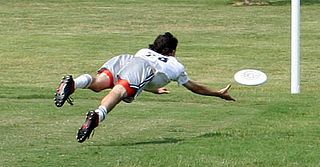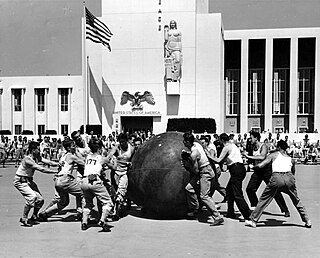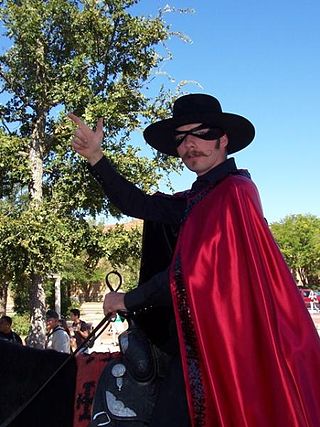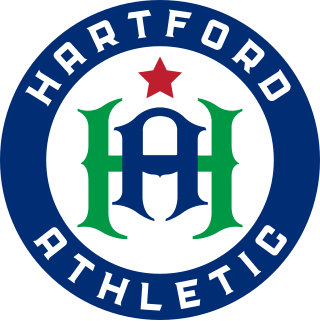
Sur-papakh is an Azerbaijani sport played on horseback.

Sur-papakh is an Azerbaijani sport played on horseback.
Sur-papakh is played between two teams of four to eight riders each on a field that is 300 to 400 metres (980 to 1,310 ft) long. The game is divided into two ten-minute halves. The object of the game is to pass a papakha (sheepskin hat) between the riders until the hat can be thrown through a ring-shaped goal similar to a basketball hoop. The opposing team attempts to intercept the hat (but may not physically contact opposing riders) to prevent the goal from being scored. [1]
Several variations of the game exist:

Association football, more commonly known as football or soccer, is a team sport played between two teams of 11 players each, who primarily use their feet to propel a ball around a rectangular field called a pitch. The objective of the game is to score more goals than the opposing team by moving the ball beyond the goal line into a rectangular-framed goal defended by the opposing team. Traditionally, the game has been played over two 45-minute halves, for a total match time of 90 minutes. With an estimated 250 million players active in over 200 countries and territories, it is the world's most popular sport.

Polo is a ball game played on horseback, a traditional field sport and one of the world's oldest known team sports. The game is played by two opposing teams with the objective of scoring using a long-handled wooden mallet to hit a small hard ball through the opposing team's goal. Each team has four mounted riders, and the game usually lasts one to two hours, divided into periods called chukkas or "chukkers".

Ultimate, originally known as ultimate frisbee, is a non-contact team sport played with a disc flung by hand. Ultimate was developed in 1968 by Joel Silver in Maplewood, New Jersey. Although ultimate resembles many traditional sports in its athletic requirements, it is unlike most sports due to its focus on self-officiating, even at the highest levels of competition. The term "frisbee" is a registered trademark of the Wham-O toy company, and thus the sport is not formally called "ultimate Frisbee", though this name is still in common casual use. Points are scored by passing the disc to a teammate in the opposing end zone. Other basic rules are that players must not take steps while holding the disc, and interceptions, incomplete passes, and passes out of bounds are turnovers. Rain, wind, or occasionally other adversities can make for a testing match with rapid turnovers, heightening the pressure of play.

Equestrianism, commonly known as horse riding or horseback riding, includes the disciplines of riding, driving, and vaulting. This broad description includes the use of horses for practical working purposes, transportation, recreational activities, artistic or cultural exercises, and competitive sport.

Buzkashi is the national sport of Afghanistan. It is a traditional sport in which horse-mounted players attempt to place a goat or calf carcass in a goal. Similar games are known as kokpar, kupkari, and ulak tartysh in Kyrgyzstan and Kazakhstan.

Polocrosse is a team sport that is a combination of polo and lacrosse. It is played outside, on a field, on horseback. Each rider uses a cane or fibreglass stick to which is attached a racquet head with a loose, thread net, in which the ball is carried. The ball is made of sponge rubber and is approximately four inches across. The objective is to score goals by throwing the ball between the opposing team's goal posts.

Pushball is a game played by two sides on a field usually 140 yards (130 m) long and 50 yards (46 m) wide, with a ball 6 feet (1.8 m) in diameter and 50 pounds (23 kg) in weight. Occasionally, much heavier balls were used. The sides usually number eleven each, there being five forwards, two left-wings, two right-wings and two goal-keepers. The goals consist of two upright posts 18 feet (5.5 m) high and 20 feet (6.1 m) apart with a crossbar 7 feet (2.1 m) from the ground. The game lasts for two periods with an intermission. Pushing the ball under the bar counts 5 points; lifting or throwing it over the bar counts 8. A touchdown behind goal for safety counts 2 to the attacking side.

Pato, also called juego del pato, is a game played on horseback that combines elements from polo and basketball. Since 1953 it has been the national sport of Argentina.

A shadbelly is a type of riding coat worn in certain equestrian situations by fox hunting members, dressage riders, eventers, and occasionally by other hunt seat riders. Shadbellies are also standard attire for the show hack classes at certain breed shows in the United States and Canada.

A potato race is one of several similar racing events where contestants compete to collect a number of potatoes as quickly as possible. Participants may run on foot or be mounted on horseback, depending on the style of race. It is not clear precisely when or where the potato race originated. Potato races of both types were most popular in Australia, England, Scotland, the United States of America and Wales. Potato races were commonly held at community events such as county fairs, rodeos, picnics, and track and field meets from at least the middle of the 19th century until approximately the 1930s.

The Masked Rider is the primary mascot of Texas Tech University. It is the oldest of the university's mascots still in existence today. Originally called "Ghost Rider", it was an unofficial mascot appearing in a few games in 1936 and then became the official mascot with the 1954 Gator Bowl. The Masked Rider has led the team onto the field at nearly every football game since. It is the nation's first school mascot to feature a live horse at a football game, ahead of Florida State's Chief Osceola and Renegade and 25 years before USC's Traveler and all other such mascots in existence today.
Jereed is a traditional Turkish equestrian team sport played outdoors on horseback in which the objective is to score points by throwing a blunt wooden javelin at opposing team's horsemen. Played by Turkic peoples in Central Asia as the essential sporting and ceremonial game, it was brought to Anatolia during the westward migration in the beginning of the 11th century.
Cowboy polo is a variation of polo played mostly in the western United States. Like regular polo, it is played in chukkas (periods) with two teams on horses who use mallets to hit a ball through a goal. It differs from traditional polo in that five riders make up a team instead of four, western saddles and equipment are used, and the playing field is usually a simple rodeo arena or other enclosed dirt area, indoors or out. Also, instead of the small ball used in traditional polo, the players use a large red rubber medicine ball and use mallets with long fiberglass shafts and hard rubber heads.
Motoball is a motorsport similar to association football, with the main differences being that all players are riding motorcycles, and the ball is much bigger. Motorcycle polo first began as an officially organized sport in the mid-1930s. In France, there are organized motoball competitions, and the sport was included in the inaugural Goodwill Games.
The 1907 Canadian football season was the 16th season of organized play since the Canadian Rugby Union (CRU) was founded in 1892 and the 25th season since the creation of the Ontario Rugby Football Union (ORFU) and the Quebec Rugby Football Union (QRFU) in 1883. This year also marked the first for the Interprovincial Rugby Football Union, which is a predecessor of the modern day's CFL East Division. The season concluded with the Montreal Football Club defeating Peterboro in the 1907 Dominion Championship game.

Chovgan, Chowgan or Chogan, is a sporting team game with horses that originated in ancient Iran (Persia). It was considered an aristocratic game and held in a separate field, on specially trained horses. The game was widespread among the Asian peoples. It is played in Iran, Azerbaijan, Tajikistan, and Uzbekistan.
Rufat Oleg oglu Dadashov is an Azerbaijani footballer who plays as a striker for German club BFC Dynamo. He also played for the Azerbaijan national team.
Hobby horse polo is a mixed team sport played on hobby horses. It is similar to other polo variants, such as canoe polo, cycle polo, camel polo, elephant polo, golfcart polo, Segway polo, auto polo, and yak polo in that it uses the basic polo rules, but it has its own specialities.

Hartford Athletic is an American professional soccer team based in Hartford, Connecticut. The club was founded in 2018 and started play in the USL Championship in 2019. It is the only pro soccer team in Connecticut.